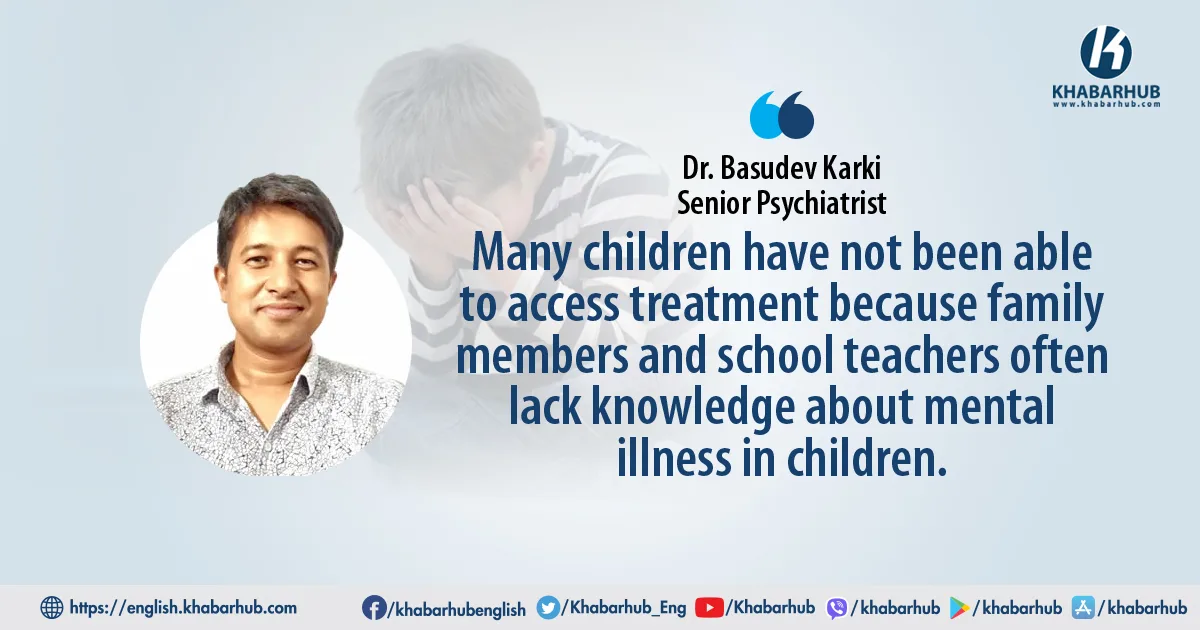KATHMANDU: Awareness about children’s mental health remains limited in our families and society.
Many are unaware that children can experience mental health issues.
Experts note that such problems can often be identified through children’s behavior and emotions.
Doctors highlight that certain behaviors may indicate mental health problems in children.
These behaviors include reduced communication, lack of social interaction, excessive talking, isolation, sadness, and frequent crying.
Data have revealed that mental health issues are more prevalent in boys than girls among children aged 2 to 8 years.
Additionally, children from poorer families are more likely to experience mental health problems compared to those from wealthier families.
Psychiatrists emphasize the importance of parents engaging with their children if they notice behavioral fluctuations.
According to senior psychiatrist Dr. Basudev Karki, the common problems are that children might exhibit symptoms like persistent sadness, excessive fear or anxiety, and disruptive behavior.
Senior psychiatrist Karki, working at Patan Mental Hospital, shared insights on this issue:
What is the state of mental illness in children?
Many children have not been able to access treatment because family members and school teachers often lack knowledge about mental illness in children.
According to our National Mental Health Survey 2077, around 5.2 percent of teenagers between the ages of 13 and 17 have some kind of mental problem.
What kinds of problems are seen in children?
There are mainly three types of mental problems common in children.
The first is related to intellectual development hindrances. The second type involves behavioral issues.
For example, children may show problems such as not fearing senior family members, being overly shy, rejecting family and cultural values, speaking less, and not socializing.
The third type is emotional problems, which include fear, depression, and psychosis.
Is it a mental problem if a child is overly skittish?
Children’s behavior is evaluated according to their age. Up to a certain age, skittish and fearful behavior can be considered normal.
However, if such behavior persists without change over a long period, it may indicate a problem.
For instance, children aged 5 to 7 should begin to obey their parents and show some discipline.
If they do not listen to their elders or create unnecessary fuss even at this age, it could be a sign of indolence.
Parents need to understand and monitor their children’s behavior as they grow.
It is said that mental problems have increased in children recently. What is the reason for this?
There are many reasons for this. Environmental and psychological factors play significant roles.
Additionally, the family, social, and school environments are also influential.
Currently, the environment from family to school is not child-friendly, which is contributing to the increase in mental problems.
The growing use of new technologies has also played a role.
It is said that the problem of suicide among children is increasing due to mental problems. How can it be prevented?
There is a close relationship between mental problems and suicide. However, it can be prevented if we adopt certain strategies. We should focus on four main areas:
Growing up in a healthy environment: Children should grow up in a socially and emotionally healthy environment, which many children currently lack.
When they do not have a favorable environment in their family, society, and school, they may make unhealthy decisions. Therefore, social and emotional aspects need to be given utmost attention.
Control over access to tools: Drugs and tools used for suicide should not be easily accessible to children.
Control over access to technology: Children are learning about suicide through various media, such as films depicting suicide scenes.
To protect them from such influences, access to social networks should be controlled, and such scenes should be minimized in films.
Access to mental health services: Everyone should have access to mental health services, especially children, who are very sensitive.
Various studies have shown that 50 percent of mental problems begin before the age of 14.
Therefore, children should be included in every program related to mental health, and they should have access to treatment. If this happens, children can be saved from the problem of suicide.









Comment